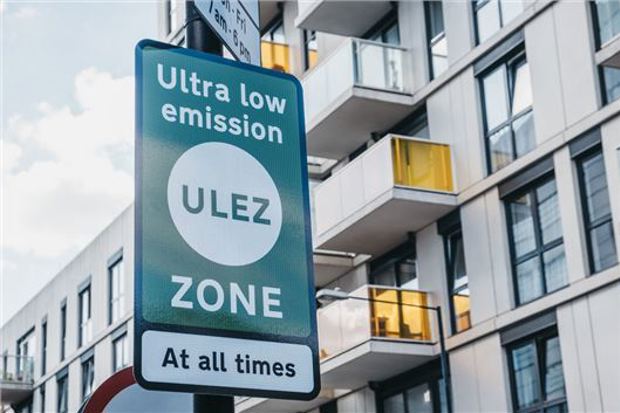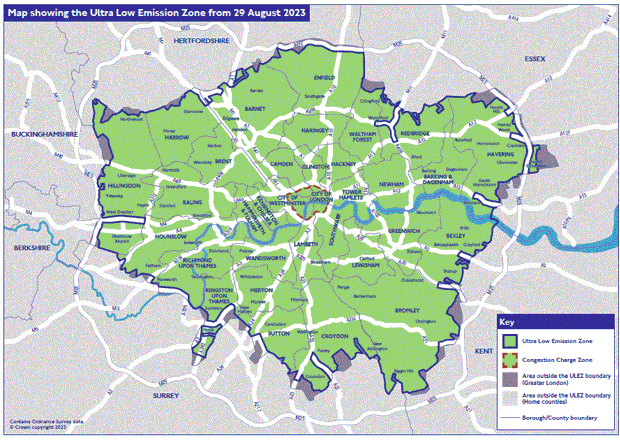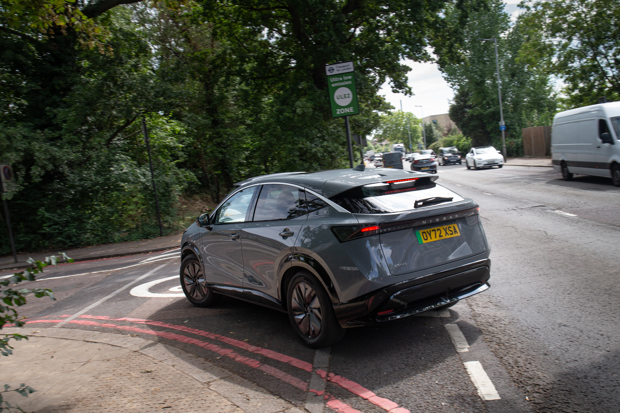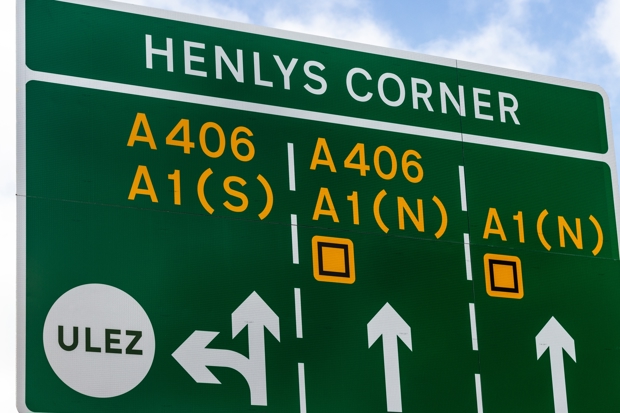ULEZ Ultra Low-Emissions Zone Explained for 2025
The London Ultra-Low Emissions Zone (ULEZ) expanded significantly in August 2023, but what is it, which areas does it now cover and what cars are affected? Our guide has all you need to know.

- What is ULEZ? We explain all
- See which areas ULEZ covers
- Find out whether your car is ULEZ compliant
- How to pay the ULEZ charge
What is the Ultra Low Emissions Zone?
The Ultra Low Emissions Zone – more commonly referred to as ULEZ – is the area of London where high-polluting cars, vans and motorcycles must pay a daily charge to enter.
Low emissions zones are nothing new and one has existed in London since 2008, but it initially existed only for trucks, buses and larger vans entering outer London boroughs, with a Congestion Charge operating in Central London from 2003.
In 2019, the emissions zones changed and the first Ultra Low Emissions Zone (ULEZ) was introduced. This saw cars and vans that didn’t meet Euro 4 emissions standards for petrol vehicles and Euro 6 standards for diesel subject to a £12.50 charge for driving inside the Congestion Charge zone, on top of the £15 daily charge.
It changed again in 2021, with ULEZ expanded to incorporate all areas inside the boundaries of the North and South Circular zones. In August 2023, this was expanded further to cover every single Greater London borough, covering most of the area inside the M25.
As a result, drivers of many diesel cars and vans and older petrol models in Greater London now have to pay a daily charge of £12.50 to drive within the massively extended zone.
How much are charges for the London Ultra Low Emissions Zone?
|
Vehicle type |
Min. emission standard |
ULEZ Charge if below emission standard |
|
Motorbikes |
Euro 3* (all bikes registered since Jul 2007) |
£12.50 |
|
Cars & small vans |
Petrol Euro 4 (since Jan 2006) |
£12.50 |
|
Diesel Euro 6 (since September 2015) |
£12.50 |
|
|
Vans |
Petrol Euro 4 (since Jan 2007), diesel Euro 6 (since September 2016) |
£12.50 |
|
Lorries & coaches |
Euro 6 (since Jan 2014) |
£100 |
Where does ULEZ cover?
The London Ultra Low Emissions Zone first operated in the centre of the capital, in the same zone that was used for the Congestion Charge. This runs from Victoria and Hyde Park in the west to Tower Bridge in the east, and from Euston Road in the north to Elephant and Castle in the south.
It expanded to become many times its original size on 25 October 2021, with hundreds of thousands of vehicles driving within the North Circular and South Circular roads potentially being liable for charges.
The latest 2023 extension has seen ULEZ expand to encompass all London boroughs with the same boundaries as the 2008 Low Emissions Zone, including many residential areas, Heathrow Airport and a number of major sporting venues such as Wembley Stadium, Twickenham and the All-England Lawn Tennis Club in Wimbledon, plus Chessington World of Adventures.
Other cities, including Birmingham, Bath and Glasgow, have already introduced emissions-based road charging schemes similar to London.
London is also planning a smaller zero emissions zone from 2025, which will be restricted to electric vehicles as well as hybrids that can drive on battery power alone for a significant distance.

When does the London Ultra Low Emissions Zone operate?
ULEZ operates 24 hours per day, seven days per week and is run by Transport for London (TfL), the capital's transport authority.
How do I check if my car is ULEZ-compliant?
The emissions rating of your car can normally be found on its V5C registration document and to be ULEZ-compliant it should have NOx emissions below 0.08g/km. There's also an online vehicle checker, run by Transport for London (TfL), which is responsible for the zone.
To to see if your car is exempt enter your reg number here.
Is my car affected by ULEZ?
As a loose rule, all petrol cars registered after June 2006 and diesels registered after September 2015 should be ULEZ-compliant, but this is not an exact measure.
Quite a few older petrol cars and a handful of pre-2015 diesels are still ULEZ exempt – including some from as far back as 2001. To be sure whether a specific petrol car is exempt or not, you can use the TfL ULEZ vehicle check tool.
Do I still have to pay the Congestion Charge as well as ULEZ?
You do. The ULEZ charge is an addition to the Congestion Charge, which costs £15 and is applicable between 7.00 am and 6.00 pm from Monday to Friday, and midday to 6.00 pm on Saturdays and Sundays, plus bank holidays. That means a trip to London could cost £27.50, simply in charges, if you drive into the centre and are required to pay both – or £40 if you enter the central zone before 6.00pm for an evening function and leave after midnight.

How do you pay to enter the Ultra Low Emissions Zone?
To pay online go to this website, where you can also set up an auto payment account linked to your registration number, or more than one registration number if you own two cars.
You can also pay by phone by calling TfL on 0343 222 2222
Is there a penalty for not paying ULEZ?
Yes. If you’re caught driving a non-compliant car in the Ultra Low Emissions Zone by TfL’s cameras and don’t pay within the 48-hour deadline, then you will receive a £160 penalty, which will be halved to £80 if you pay within 14 days. The registered owner of the car is liable. If there has been an error, or your car was stolen, then you will be able to appeal.
What vehicles are exempt from ULEZ?
There are a number of vehicles and drivers that qualify for an exemption from paying the ULEZ charge, at least temporarily.
If you’re disabled, Blue Badge holders do need to pay the ULEZ charge if their vehicle doesn’t meet the ULEZ emission standards.
However, there are three temporary exemptions – if your car is registered with the DVLA as a disabled passenger vehicle, if it’s a wheelchair accessible vehicle or if you’re receiving certain disability benefits, you’re exempt from paying until 24 October 2027. Wheelchair accessible private hire vehicles are included in this grace period, too.
NHS patients deemed too ill to travel by public transport can claim back ULEZ and Congestion Charge fees. Check with your hospital if this applies to you.
London-licensed taxis are exempt from ULEZ charges. Older, more polluting taxis are subject to a 12 year age limit, with newer, cleaner taxis extended to 15 years.
Not-for-profit organisations that operate minibuses used for community transport can register for a temporary 100% discount of the ULEZ charge until 26 October 2025.
Historic vehicles are exempt if they were built more than 40 years ago, provided they’re not being used for commercial purposes.
If you’re driving a specialist agricultural vehicle, a military vehicle, a non-road going vehicle allowed to drive on the road like an excavator, or certain types of mobile cranes, or if you’re a travelling showman, you’ll also be exempt from paying ULEZ charges.
If I live in London do I get a discount for ULEZ?
Sadly not. While Central London residents registered for the Congestion Charge zone historically got discounts, this does not apply to ULEZ. The only real option is to change your car. Any car that meets or exceeds the emissions standard is exempt from the charge, so drivers of these won’t need to pay to enter the zone.
Some types of car, such as classic vehicles that qualify for the historic vehicle tax class, are also exempt, but you need to declare this to Transport for London (TfL) first.

How is ULEZ monitored?
ULEZ is monitored by static and mobile cameras, and the charge applies 24 hours per day, seven days per week. You pay per day so if you entered the city at 11pm and left at 1am, for example, you’d need to shell out for two days, or £25.
What is the cleaner vehicle discount for the Congestion Charge?
Battery electric or hydrogen fuel cell vehicles are eligible for the cleaner vehicle discount, which gives drivers a 100% discount on the £15 Congestion Charge. It was formerly called the Ultra Low Emission Discount (ULED).
From 25 December 2025, this will be discontinued and drivers of these vehicles will have to pay to enter the Congestion Charging zone during its operating hours, unless they qualify for another type of discount. They will not have pay to ULEZ charges, though.
Drivers of qualifying cars can apply for the discount online, where they will have to provide a copy of the V5C vehicle registration certificate issued by the DVLA that clearly shows that the vehicle is registered as fuel type ‘battery electric’ or ‘hydrogen fuel cell’.
It costs £10 per vehicle per year to register for the discount.
Are classic cars exempt from the ULEZ?
If your car was built more than 40 years ago, you can apply with the DVLA to stop paying vehicle tax. If you do this, any vehicle with this historic vehicle tax class is exempt from ULEZ, provided it isn’t being used for commercial purposes.
The 40-year date is a rolling system, so for example if you are looking to apply for a ULEZ exemption in December 2024, your car needs to have been built before December 1984.
If your car was built before 1 January 1973, it is already exempt from ULEZ, regardless of commercial use.
If your vehicle meets all the criteria but is registered outside the UK, it still qualifies for an exemption, provided you register it with TfL before you travel.
